【新唐人2012年4月6日訊】中國內蒙古的蒙古族村民,因不滿當地國營興隆沼林場非法侵佔土地,前往當地政府抗議,遭到警方鎮壓,有22人被捕。3號,又有40多名村民到奈曼旗政府抗議,要求放人,當局接見了五名代表,但提出條件,要求不再提土地的問題才放人,牧民沒有接受,並表示會抗爭到被捕的牧民獲釋為止。
內蒙通遼市奈曼旗明仁蘇木下屬村莊「圖力格嘎查」的數百名居民,4月2號抗議當地政府非法佔地,奈曼旗公安部門則出動大約80名警察和30輛警車,強力打壓居民的抗議行動。有消息傳出,共有22名村民被捕,5人受到重傷,示威活動持續到3號。
據「南蒙古人權信息中心」消息,4月2日下午,數以百計「圖力格嘎查村」的居民抗議當地政府「非法佔地」,並且試圖阻止挖土機進入。當地居民代表說,「當局多年來佔用6萬畝的土地,在過去數個月中,曾經多次組隊向通遼市政府、內蒙自治區政府、甚至派代表到北京向中央政府陳情。但問題未被重視,公安部門還派人將赴京上訪的居民帶回,而旗政府領導接見他們時,竟然威脅要將上訪代表逮捕或是拘禁。」
抗議村民打出「停止非法拘禁」、「釋放被捕牧民」以及「歸還土地」等標語。
隨後,奈曼旗公安局派來80多名警察和30多部警車,村民遭到暴力鎮壓,22人被抓,5人嚴重受傷。
被捕的22名牧民,目前有三位健康狀況惡化必須送醫治療。據牧民說,警察將不明物體噴入他們的嘴裡後,被拘留的村民都出現嘔吐、頭暈症狀。
3號晚上,抗議的蒙古族村民給「南蒙古人權信息中心」發手機短信說,「在政府釋放所有被拘留的人,補償農民的損失,懲罰毆打抗議者兇手,歸還我們土地之前,不會停止抗議活動。」
過去蒙古土地政策採用民族所有制,後來共產黨將它改為國有制,只給使用權,等於是對蒙古土地的一種剝奪。但共產黨卻隨意佔用土地,像設置軍馬場、打靶場、油田等。而大規模的土地徵用和能源開發,導致牧民賴以生存的傳統草場環境出現惡化。
德國「內蒙古人權同盟」主席席海明表示,內蒙的鎮壓一直存在,共產黨近幾年瘋狂的掠奪內蒙資源,蒙古人卻得不到任何好處,為了生存才會用遊行或抗議的形式來跟共產黨發出聲音。
席海明:「在面上廣東離香港近,國際社會關注比較強,所以在烏坎事件上做了讓步,但是共產黨的統治已經到了危急階段,所以它不能夠讓步,所以它就最後要在內蒙啊、西藏這些地區,邊疆地區下手又再狠一些的,他們既要鎮壓當地人民的反抗,又要殺雞給猴看,震嚇、威脅別的地方的不滿。」
席海明表示,內蒙事件並不是孤立的事件,他一直存在的問題就是土地所有權被剝奪,土地被掠奪了。
席海明:「因為蒙古草原原來是民族所有制這個土地權,後來共產黨來了以後搞土改啊,最後通過法律這個土地國有化,最後牧民對土地有使用權,但是連最起碼的使用權都沒有保障了。」
2011年5月,內蒙古錫林郭勒盟牧民莫日根因領導土地維權、保護生態環境而遭煤礦卡車軋死,這起事件曾引發當地數千民眾的抗議。席海明指出,內蒙古土地維權的困境,與中國邊疆統治政策對少數民族的壓制有關。
「南蒙古人權信息中心」主任恩赫巴圖,也在媒體上呼籲國際社會關注蒙古人現在的人權狀況。
採訪/陳漢 編輯/李庭 後製/孫寧
========================
Inner Mongolia Protests “Won't Stop”
Recently, villagers in Inner Mongolia went
to the local government to protest again.
They were dissatisfied with the local state-owned
Xinglongzhao illegal occupation of land.
However, the police suppressed them,
and 22 people were arrested.
On April 3, over 40 villagers went to Naimanqi government
to protest and ask for the release of arrested villagers.
Authorities met with five representatives, but asked them
not to talk about the land issue before anyone is released.
Villagers did not accept the condition, and indicated
they would fight until the arrested herders are freed.
On April 2, hundreds of residents of Tuligacha Village,
Tongliao City, Inner Mongolia, went to protest
against their local government's illegal land occupation.
Naimanqi Public Security Department sent 30 police cars
and about 80 policemen to suppress the protests.
It is said that 22 villagers were arrested, and 5 seriously
injured. The demonstrations continued to April 3.
The Southern Mongolia Human Rights Information Center
announced of another protest on the afternoon of April 2.
Hundreds of residents in Tuligacha Village protested
against local government's illegal land occupying, trying to prevent the entry of an excavator.
Representatives of local residents said that the authorities
had occupied 10k acres of land for many years.
In the past few months, they have repeatedly sent teams to
the governments in Tongliao, Inner Mongolia, and Beijing.
But the problem is not paid attention to. Public security
departments sent policemen to take the petitioners back.
When government leaders met with them, they threatened
to even arrest or detain them, said the representatives.
The villagers held up banners, "Stop illegal detention,"
“Release arrested herdsman," and "Return the land."
Later on, Naimanqi Public Security Bureau sent out
about 80 police officers and 30 police cars.
The villagers were violently suppressed.
Twenty two were arrested, and five were seriously injured.
Three of the 22 arrested villagers had deteriorating health
and had to go to hospital.
According to the herders, police injected unknown
substance into their mouths, and the detainees started to vomit and got dizzy.
On the evening of April 3, villagers sent text messages to
the Southern Mongolia Human Rights Information Center.
They said, they “won't stop protesting until the government
releases all detainees, compensates their losses,
punishes people who harmed petitioners, and returns their land.”
In the past, the policy on the Inner Mongolian land
categorized it as a national ownership.
However, the Chinese Communist Party (CCP) changed this
to state ownership and gave them the right to use it only.
This is a form of land deprivation. CCP freely occupies land,
setting horse farms, shooting galleries, oil fields, etc.
Large-scale land acquisition and energy development
led to harming the traditional grasslands which herdsmen live of.
Xi Haiming, Chairman of Inner Mongolia Human Rights
Allies in Germany commented on the issue.
Xi said, repression of Inner Mongolia had always existed,
the CCP had crazily ravened resources of Inner Mongolia.
Especially in recent years. But Mongols didn't get anything.
They just march or protest to the CCP in order to survive.
Xi Haiming: "Guangdong is near Hong Kong, which enjoys
the international community'attention, so CCP yielded
somewhat there in regards to the Wukan events.
Now the rule of the CCP has reached a critical stage,
so it can not compromise.
Thus, it will be stricter in Inner Mongolia, Tibet
and other border areas.
They suppress local people's resistance, and also give
a warning to others, to threaten and frighten people."
Xi Haiming thinks Inner Mongolia' incident is not an isolated
case. Land ownership deprivation is widely spread.
Xi Haiming: "The Mongolian grassland was originally
national ownership, but the CCP conducted a land reform.
They made the land state-owned by law,
and just gave pastoralists the right to use it.
However, now even the basic right to use it
is not guaranteed anymore."
In May 2011, Mo Regen from Xilinguole, Inner Mongolia,
led herders to protect against their land' abuse.
Mo was run over by a coal mine truck and this incident
triggered protests by thousands of local people.
Xi Haiming pointed out that the Inner Mongolia land issue,
is rather related to Chinese authorities' policy of suppressing ethnic minorities.
Southern Mongolian Human Rights Information Center's
Director, Enhe Batu,
also urged the international community to pay attention to
the human rights violations in Inner Mongolian.
看下一集
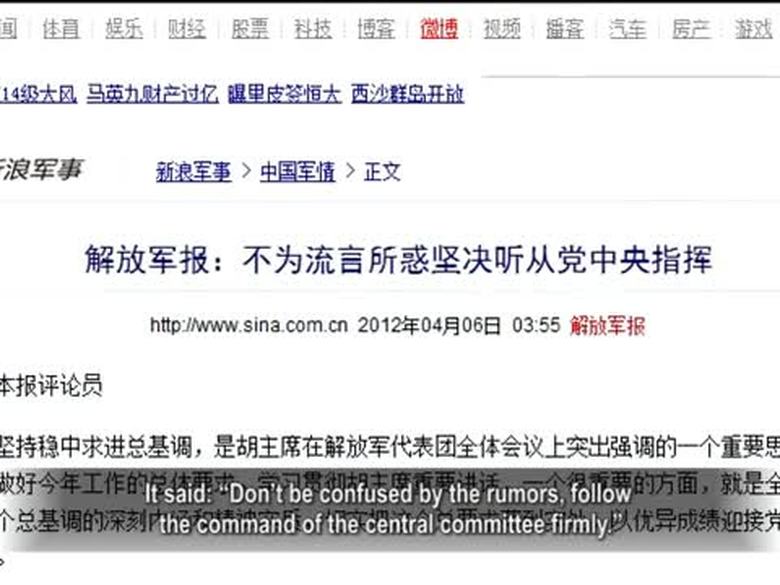
【禁聞】軍隊再表忠 大員輪番表態挺胡棄江

【禁聞】中共特色 部委食堂一元錢午餐
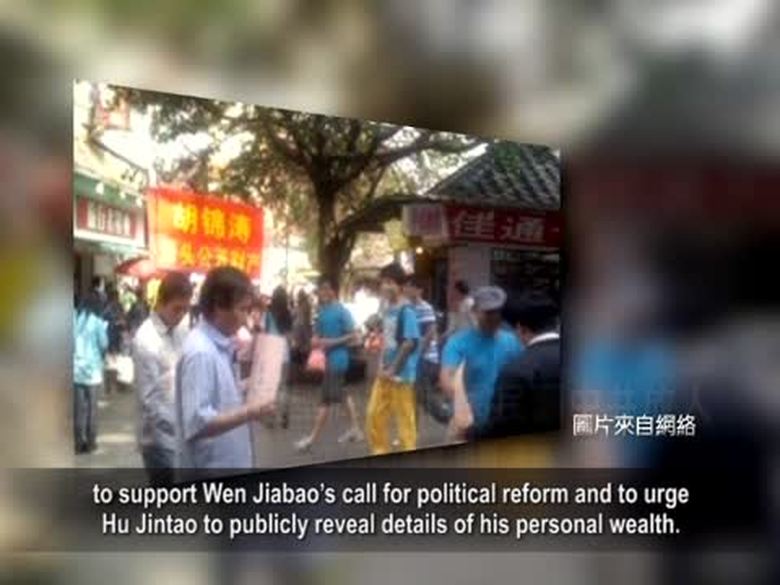
【禁聞】廣州街頭舉牌被抓 網民籲中共放人
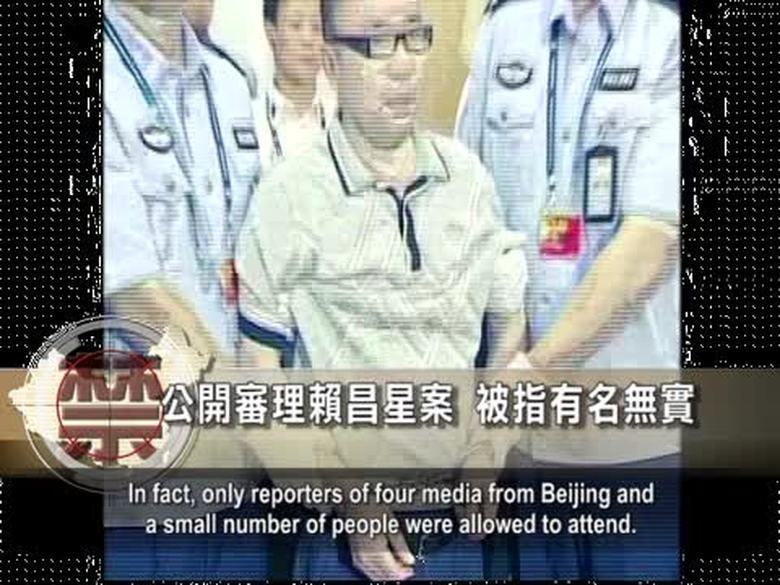
【禁聞】公開審理賴昌星案 被指有名無實
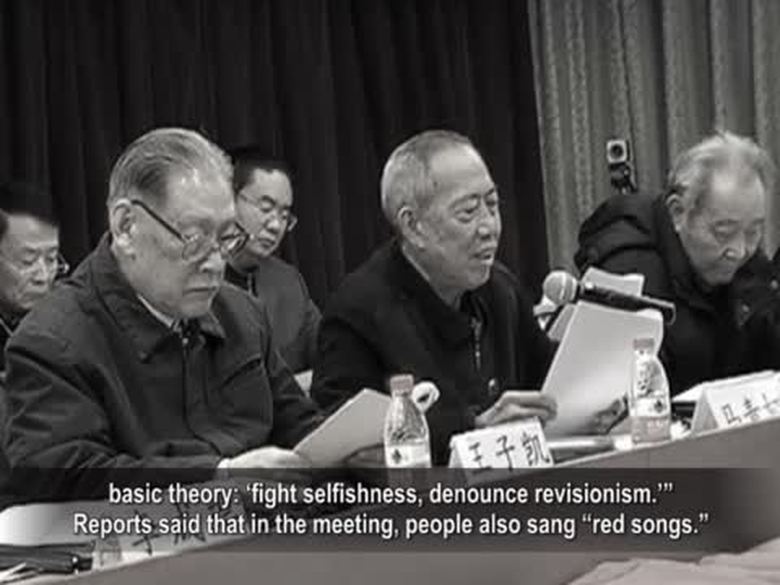
【禁聞】毛派開班唱紅 外媒:批毛者居多

【禁聞】毛派開班唱紅 外媒:批毛者居多
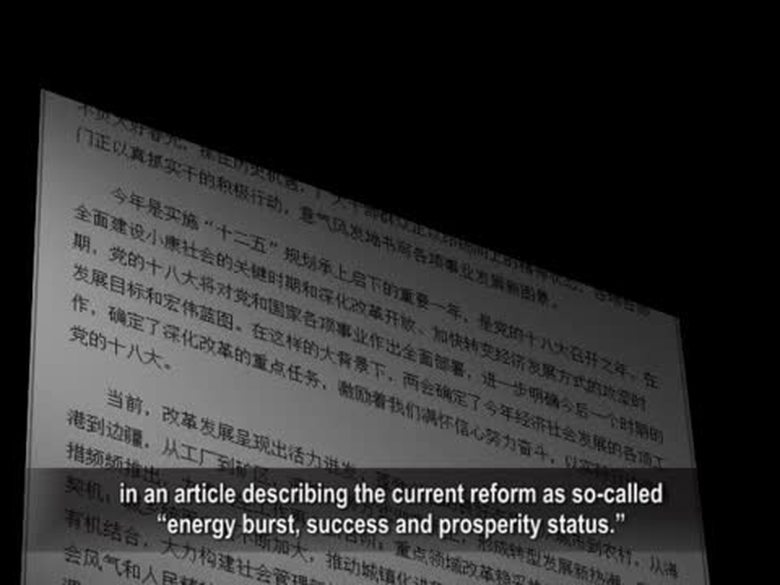
【禁聞】黨報十八大信心喊話折射政權危機

【禁聞論壇】中共要政改了嗎?

【禁聞】全軍審計小組成立 胡項莊舞劍?

【禁聞】著作權只保障3個月 進步?倒退?

【禁聞】藍述:中共不可逾越的兩大危機(上)

【禁聞】六四領袖方勵之離世 大陸封鎖消息

【禁聞】百度解禁「法辦江羅」 血債派罪行曝光

【禁聞】「拿下薄熙來」 喬石發揮作用

【禁聞】看中共內鬥 歐政要促當權者順民意

【禁聞】中國省級公檢法司“四長”換血








